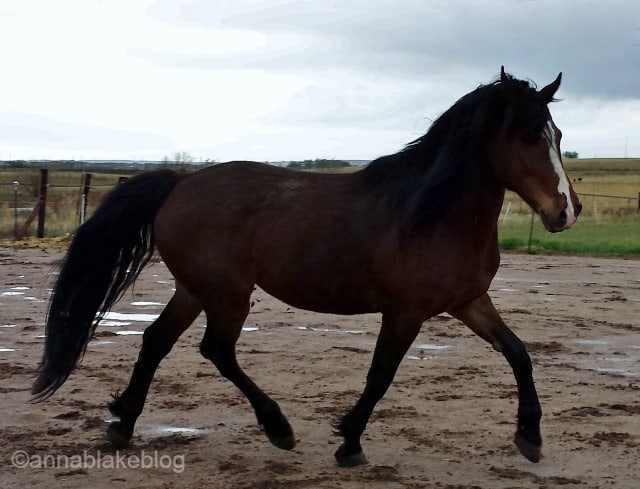Is there a natural way to ride a horse? Is it possible to ride in such a way that the horse goes willingly forward, without constriction, as if he were moving at liberty? Is there a path to a different sort of ride, where kindness and understanding are the primary aids? Or should work look like struggle?
Spit has been flying on the internet this week. There’s dressage news from the FEI European Championships at Achen and I have to defend my chosen riding discipline one more time. Flash: there was rollkur–hyper-flexion of the neck–done by dressage riders there. Yes, it’s against the rules; but more than that, it insults the beauty and integrity of our historical tradition. And yet even more than that, it physically disables horses.
I should add that there is a public facility down the road from my barn, filled with riders in western saddles, shank bits and vicious spurs, jerking away mindlessly at their horse’s bits, metal on bone, doing as bad or worse–instructors and students alike. Despicable. Not the disciplines; it isn’t about tack or what we ask the horse to do under-saddle. It’s about how we ask.
Disclaimer: I harp on this topic all the time but Totalis retired this week at 15, and locally, the Dual Peppy abuse case ended in an appeal after sentencing. I am sad. When I started in dressage, the best horses were just coming into their prime in their teens. At the same time, professional trainers are see-sawing on reins and teaching their students do the same. The line between a kind, responsive partner and a broken-down rescue horse is defined by a rider’s awareness and sensitivity all too often–and at every level of riding. So I’m mad, too.
Want a history lesson? Some of the first writing we have about horses is from ancient Greece. Simon and Xenophon wrote about the art of riding:
For what the horse does under compulsion… is done without understanding; and there is no beauty in it either, any more than if one should whip and spur a dancer. -Xenophon, b. 430BC
At that time, Euripides was writing plays and the Parthenon was just finished. The Greeks loved culture: art, music, dance. And riding horses.
At the same time, other cultures like the Romans were more barbaric, more materialistic, and less enlightened. It isn’t a value judgement so much as a statement of priorities. Horses were treated more harshly in those cultures where warriors who used them as tools. Romans left no writing about horses during these years.
Through the centuries, these two approaches to riding continued. The equestrian art was increased by one culture, but then “bastardized by war” in another. And so on to the 2015 European Championships. Sometimes we are evolving with sensitivity as riders, and sometimes we’re using brutality as a means to an end.
Under no circumstance should your hand disturb the horse’s mouth. You must learn to stay calm in all situations and control your emotions. There is no room for anger. -Xenophon
There is no trainer in this world who raises their hand and proudly says, “I train with violence and cruelty.” Yet dressage riders are excused from the arena when there are traces of blood on their horse’s bit. Men in cowboy hats make videos of themselves whacking horses in the head with whips–while holding a lead rope tight and playing to the crowd–and pass it off as horsemanship.
Everyone has a good line. Everyone defends their technique in positive terms but walking the talk is a different thing. We actually have to demonstrate that our actions match our words. We don’t like what we see, so to many of us competition is the same thing as abuse. Riders who train with finesse and kindness do compete and win. We need to peacefully claim back that ground, especially in the show arena. It’s a challenge to maintain focus in a storm of show reality and easy to fail our ideals. And brutality will always come easier to a predator, a human being, than vulnerability and honesty. We do horses a disservice to not step out past our comfort zone and let our voice be heard, and more so, seen in our happy, relaxed horses.
Nuno Oliveira defines dressage as a conversation with a horse on a higher level, one of courtesy and finesse. Times change but classical principles remain: the horse should be a partner and not a slave. The goal of equestrian art is the perfect understanding with our horses, which requires freedom of mental and physical contraction. The joy of the horse is the ultimate goal.
In our world today, we see two approaches to training horses and the roots are clearly visible in history. The only real question is how to continue. Who do we want to be as riders? As human beings? Are you willing to acknowledge the version of yourself reflected in your horse? Or is there more to learn?
Control or negotiate. Wrestle or dance. Slave or partner. War or love.
With a nod to Totalis, Dual Peppy, and all the horses who paid dearly for our dreams–and a hope that we will do better for your offspring than we have for you.
Anna Blake, Infinity Farm.

You need to be a member of Barnmice Equestrian Social Community to add comments!
Join Barnmice Equestrian Social Community